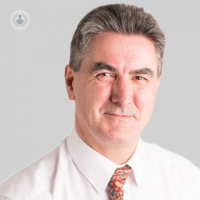Wisdom teeth: FAQ
Written by:Wisdom teeth are the final set of molars at the back of the mouth, typically erupting in late adolescence or early adulthood. Due to limited space or abnormal growth angles, they often become impacted, causing pain, infections, and difficulties in cleaning, Leading consultant oral and maxillofacial surgeon Professor Andrew Sidebottom answers your frequently asked questions about wisdom teeth.

What are the common signs and symptoms of wisdom teeth problems?
Wisdom teeth, located at the back of the mouth, are the final set of teeth to emerge. Originally serving as extra teeth to aid in chewing fibrous diets, they are now often unnecessary and can pose problems due to limited space for eruption. The lower wisdom teeth commonly cause complications, although this is not the case for about one-third of individuals. These issues may manifest as pain and swelling, known as "pericoronitis," or difficulty in cleaning the adjacent tooth, leading to potential dental problems.
Incomplete eruption can result in the formation of a cyst around the tooth, which can grow slowly and cause further complications. In rare instances, they may even weaken the jaw and are present at the site of a break due to an injury.
At what age do wisdom teeth typically emerge, and why do they often cause issues?
Wisdom teeth typically emerge through the gums during the late teenage years, but they may sometimes remain embedded for an extended period and only surface later in adulthood, particularly when other teeth have been lost, giving them space to erupt.
Due to limited space or abnormal growth angles, they frequently become impacted, unable to fully emerge and becoming lodged against the neighbouring tooth.
What complications can arise from impacted wisdom teeth, and how are they usually treated?
Impacted teeth can cause pain, infection or form a cyst. Additionally, they can also make it difficult to clean the tooth in front, increasing the risk of gum disease or decay. In cases where a jaw fracture has occurred or when planning jaw surgery (osteotomy), impacted teeth may interfere with treatment.
Initial management involves addressing any infection and providing guidance on maintaining cleanliness in the affected area. If significant issues persist or infections recur frequently, extraction of the tooth may be necessary. This procedure can be performed using local anaesthesia injections or under general anaesthesia in a hospital setting. In some instances, the surgeon may recommend removing only the crown of the tooth if its roots are close to the nerve responsible for sensation in the lower lip.
Is it necessary to remove wisdom teeth even if they are not causing immediate issues?
National guidelines, such as those outlined by NICE (National Institute for Health and Care Excellence), provide recommendations regarding the removal of wisdom teeth, which surgeons adhere to when advising patients. The most common causes for extraction include recurrent infections, cyst development, or decay affecting the adjacent tooth. However, if wisdom teeth are not causing any problems, they can be monitored during routine dental checkups by your dentist.
In some cases, wisdom teeth are retained because the surgical removal procedure carries risks of complications, such as numbness of the lip or tongue. When the teeth are not causing significant issues, it is often deemed safer to leave them in place.
What are the available treatment options for relieving pain and discomfort associated with erupting or impacted wisdom teeth?
The first step in addressing the issue involves thorough cleansing of the affected area using a toothbrush and, if necessary, a single tuft brush. It's important not to be worried if brushing leads to bleeding, as this indicates inflammation that needs to be addressed. Using chlorhexidine mouthwash once or twice daily can aid in maintaining cleanliness. If the infection persists, your dentist may prescribe a course of antibiotics and recommend a referral to an oral and maxillofacial surgeon.
If you would like to book a consultation with Professor Andrew Sidebottom, simply visit his Top Doctors profile today.


